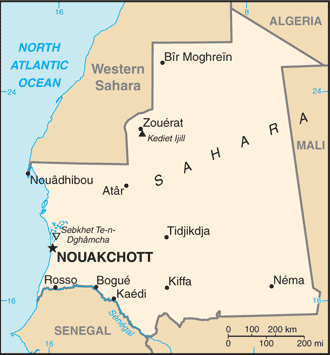Mauritania

The Islamic Republic of Mauritania has an estimated population of 3.3 million (UN, 2010). The capital is Nouakchott. Mauritania has an area of 104 million sq km (398,000 sq miles). The main languages are Arabic (official), and French.
In 1960, Mauritania became independent from France. Since gaining its independence, Mauritania has been mostly ruled by military governments through coups. However, in April 2007, the country experienced its first free and fair presidential election and chose its first democratically elected president. Slavery has been banned since 1981, but it is believed that it still affects large populations of Mauritanians. The country continues to experience ethnic tensions between the black population, the white population, and the Arab-Berber communities. Furthermore, there is a serious concern of a growing terrorism threat by al-Qaida in the Maghreb (AQIM).
Although Mauritania has signed most of the international conventions in relation to women's rights, the law remains deeply discriminatory against women. Under the Islamic Sharia law, polygamy is legal in Mauritania and men are the heads of the households. Violence against women, such as domestic violence, Female genital mutilation, rape and other forms of sexual abuse, remain widespread throughout the country. There is no specific law that prohibits violence against women and the state does little to combat it.
- Mauritania ratified the Protocol to the African Charter on Human and Peoples Rights on the Rights of Women in Africa (The Maputo Protocol) on the 21st of September 2005.
- The Convention on the Elimination of All Forms of Discrimination against Women (CEDAW) was ratified by Mauritania on the 10th of May 2001.
- Mauritania has not yet adopted a National Action Plan on United Nations Security Council Resolution 1325 (UNSCR 1325).
- There are no former or current UN Peacekeeping mandates in Mauritania.
